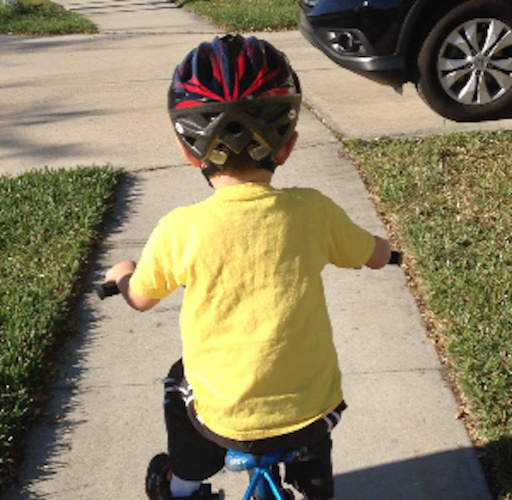A few days ago, I was talking with a couple of colleagues at school. One of them teaches a class with a little girl who has autism, and she was thrilled because the girl actually came up to her and tattled on another child. She was just so happy to see her engaging in conversation and speaking up for herself. This led us into a conversation about how we approach children with autism differently from neurotypical children. By the way, when I use the word neurotypical, this simply means people who are not on the autism spectrum.
This led my colleague to ask a question I think many are wondering but are afraid to ask: “What’s it like to raise a child who has autism?” I thought I might try to answer her question here. Please know I can only speak for my own autism parenting experience, because each family has its own unique set of circumstances. There’s a saying in the autism community that if you’ve met one autistic person, you’ve met one autistic person. I know many children on the spectrum can display much more severe behaviors than what we deal with on a daily basis.
So, with that disclaimer, I give you…
10 Ways I Parent Differently Because My Child Has Autism
1. I let my kid jump on the bed.
… Or at least I did before we bought him a trampoline. I learned when Ben was very young that he needs to move — all the time. In this same vein, I never take away his physical outlets as a consequence. Ben has sensory needs that need to be met. If left unchecked (as in, if he sits too long without a motion break), he can become overstimulated or anxious, which can lead to intense emotions.
Jumping helps. So does crashing into a mat. So does swinging. And yes, we have an indoor swing in the playroom for this very purpose. Many neurotypical children enjoy swinging, jumping and crashing. For Ben, it’s as necessary as eating, breathing and sleeping.
2. I pack him the same lunch every day.
Yes, I want my child to have variety in his diet as much as the next parent, and we do encourage him to try new foods as much as possible. However, there are only a limited number of foods Ben will eat. Part of this is because he’s bothered by foods with texture. Part of this is because he likes routine and consistency. This is why he requests the same cereal every morning when he gets his breakfast at school. God bless the cafeteria ladies who save his favorite flavor of juice for him when they’re running low. This is also why I pack him essentially the same lunch every day. We’re working on the food thing as best we can, but it’s not easy, so yes, we pick our battles.
3. I discipline differently than some other parents.
Early on, I learned the difference between a tantrum and a meltdown. A tantrum happens when a child decides to throw a fit to get his way. You can spot a tantrum because a child is watching for your reaction and is in control of the tantrum. The child can stop a tantrum at any time. A meltdown occurs when a child becomes overwhelmed by sensory input or emotionally dysregulated. A meltdown is much more emotionally intense than a tantrum, and once a child reaches a full-fledged meltdown, they’re no longer in control.
The meltdown is just as scary or more for the child than it is for those watching it happen. So, yes, my husband and I have rules and consequences for my son, and we try to be very clear about our expectations. Our son’s behavior is almost never a result of defiance but rather presents itself as an emotional outburst (often tears) as a result of frustration sensory overload or an unexpected change in routine. Therefore, while we give consequences, we are very gentle with him and try to give him tools to handle his big emotions. When his emotions ramp up, then I have to make myself very calm. Which leads me to…
4. I spend most of my money on squishy balls and Play-Doh.
Many kids like these things too, but for my kid, they are a really big deal. One of the strategies we’ve taught Ben for dealing with his emotions is to squeeze a squishy ball. He has a huge collection of them for this very purpose, and heaven forbid one pops, rips or breaks. We have social stories ready for this very purpose (“Sometimes our toys break…”).
Play-Doh is another necessary tool. It builds his hand strength, which helps him with fine motor tasks like writing. One of his favorite things to do is open a brand new container of Play-Doh and inhale its unique smell. Recently we learned to make Play-Doh using Kool-Aid, and he’s been in heaven experimenting with different scent combinations.
5. My life feels like one big movie script.
Many children on the spectrum who are verbal like Ben engage in something called echoalia. This means that they parrot back phrases that they hear others say. Sometimes they may repeat a word or phrase right after the speaker says it, but in Ben’s case, it’s often stored away in his memory for later. Often called scripting, Ben can memorize lines from his favorite books and movies and uses them during conversations and playtime. I know his teachers think he has a vivid imagination (which he does), but they probably don’t realize just how often he’s channeling one of his scripts.
For example, when he says, “We regret to inform you that chapter three was a dream,” I know he’s quoting “Bad Kitty Gets a Bath,” or when he pretends to hack up a hairball in class (sorry Mrs. B), he’s acting out a scene from a chapter in “Bad Kitty School Days.” Often he will use lines from these scripts in conversations, which he did tonight when he called Daddy back upstairs after bedtime and asked, “What about goodnight kisses?” in a perfect Agnes voice from the movie “Despicable Me.”
6. We live our life by rituals and routines.
Every parent knows the importance of having consistency and routine in their child’s life, but for Ben, this predictability is his rock in what can be a chaotic and confusing world. I’m reminded of this any time I deviate even slightly from our rituals. Bedtime is a great example. I’ve never taught him to do this, but I swear my kid can tell time. If I try to start the routine a few minutes before the regular time, he’ll point to the clock and protest, “It’s too early!” After brushing his teeth, books and a story of what’s happening tomorrow (our social story that prepares him for the events of the next day) and prayers, I say the same phrase: “Mommy will be on Mommy’s bed. Ben will be on Ben’s bed. Have a good night sleep and I’ll see you in the morning.” There’s almost something sacred about our ritual. He needs it to feel centered and secure.
7. I celebrate the little things and find joy in ordinary moments.
Most parents take for granted that their child will walk, talk, wave “bye bye,” say “I love you,” ride a bike… For some parents, each of these milestones is a long time coming, if ever. So I try to never, ever take for granted the progress Ben makes. Like the first time he had a real conversation with another person. Or the time he started a game of hide-and-seek with some kids at the playground. Or the moment when he snuggled up to me in the chair and leaned over to kiss me on the cheek. These moments take my breath away.
8. I let my kid have an iPad.
Yes, I said it. My kid has had an iPad since he could barely walk. I know some view this as indulgent, but I’ve seen Ben benefit from the programs it offers. We limit the amount of time he uses it, and lately he hasn’t even asked for it at home in the evenings because he’s busy with art projects or checking on his trains. However, I do rely on it when we have to wait for extended periods of time at the doctor’s office or if we take a long car ride to a therapy session. And, on the days when he has to stay a long time in the after-school program, it gives him something to share with the other kids. The coolness factor certainly doesn’t hurt.
9. I honor my child’s requests whenever possible.
When Ben communicates to me that something is too much for him, I listen because I’ve seen what can happen when I fail to heed his warning. Like the time I kept him in a dark theater when he was petrified of the huge dragon puppet and then wouldn’t go into another dark place for months. So if Ben doesn’t want to go on a ride at Disney, I listen and honor that request. This doesn’t mean he always gets his way. If his safety is at risk or if there are existing plans that cannot be altered, he does have to learn to deal. But if I’m able to give him choices, I always do. And if his request is a reasonable one that I can honor, I always will because I want him to know he can always communicate his needs to me and they’ll be heard and respected.
10. I compare my kid to my kid.
Another thing I stopped doing very early is worrying about what my friend’s kid on Facebook is able to do that my kid can’t. I’ve learned it’s much more productive to measure Ben’s progress against himself. And while this doesn’t mean I don’t have goals and expectations for him, I’m not going to stress if he’s not making the most soccer goals or if he doesn’t make captain of the debate team. If he gets those things, it’s definitely a bonus, but I’m cheering for the progress he’s making because he always gets there in his own time.
A longer version of this post originally appeared on Changed For Good Autism.
Getty image by AzmanL


